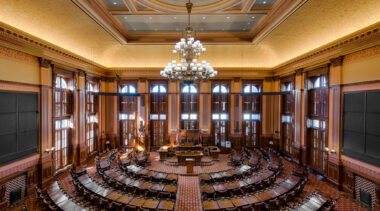-
A Schedule III designation is still overly restrictive for marijuana
A Schedule III designation fails to fully align federal and state law in the states that authorize some form of commercial market in marijuana.
-
Congress must address the transit productivity crisis
Public transit ridership in the United States fell during the COVID-19 pandemic and, as of the first quarter of 2024, has only recovered 76.2% of its 2019 riders.
-
New Jersey Senate Bill 2283 would decriminalize psilocybin
Senate Bill 2283 would allow personal possession and cultivation of psilocybin in a private residence.
-
Alaska pension proposal would impose big costs but have little impact on recruitment
Senate Bill 88 could ultimately cost the state an additional $9.6 billion without improving recruitment or retainment of public workers.
-
Michigan bills would help parents give kids reasonable independence
The Michigan bills would establish clear allowances for kids traveling to or from school, playing outdoors, and remaining at home alone for reasonable periods.
-
EPA should deny a Clean Air Act waiver for California’s locomotive emissions regulation
The California Air Resource Board’s In-Use Locomotive Regulation mandates unproven technology and would impose large compliance costs.
-
Louisiana bill would enact a legal cannabis market with high barriers to entry
Louisiana's proposed marijuana legalization bill would limit opportunities for entrepreneurs and limit legal options for consumers.
-
Missouri Senate Joint Resolution 71 would unwisely fund public pensions through fines and fees
If governments are going to offer pensions, they need to be willing to directly appropriate the funding to cover those pension promises.
-
AI model openness is a question for the market, not regulators
Public policy should focus on working with industry to standardize and deploy AI detection and evaluation systems in appropriate areas.
-
Hawaii Senate Bill 3335 has some cannabis protections but needs improvements
The proposal contains many constructive components but also would impose unnecessary restrictions on licensing.
-
Kentucky House Bill 124 would reduce occupational licensing barriers for former offenders
House Bill 124 would reduce barriers to employment while maintaining the protections appropriate for ensuring public safety.
-
House Bill 481 would help prevent the politicization of Georgia’s public pension fund investments
Public pension systems should invest to maximize returns so constitutionally protected retirement benefits are delivered at minimal cost to taxpayers and employees.
-
Public-private partnership is best way to fund Calcasieu River Bridge replacement
Financing the Calcasieu River Bridge project using a public-private partnership and funding it with tolls is the realistic delivery option that is best for Louisiana taxpayers.
-
Examining the solvency and resiliency of Ohio’s public pensions
Ohio’s public pensions have over $68 billion in unfunded liabilities and need further reforms.
-
Net neutrality would weaken America’s broadband infrastructure
Despite the necessity of broadband in modern life, a change to Title II would not make the internet faster, more open, or more fair.
-
Louisiana’s Calcasieu River Bridge public-private partnership project should be approved
The proposed P3 replacement of the Calcasieu Bridge on I-10 near Lake Charles is a wise financial decision for drivers and taxpayers.
-
Ohio should abolish the death penalty
Eleven people have been exonerated while awaiting execution in Ohio since 1979, including three within the past 10 years.
-
Massachusetts’ proposed cigar tax increase would not improve health outcomes
S.1848 should raise concern that the state will enlarge the already substantial illicit tobacco trade, push sales and tax revenue to other jurisdictions, and punish premium cigar stores and lounges that have almost no appeal to youth.

















